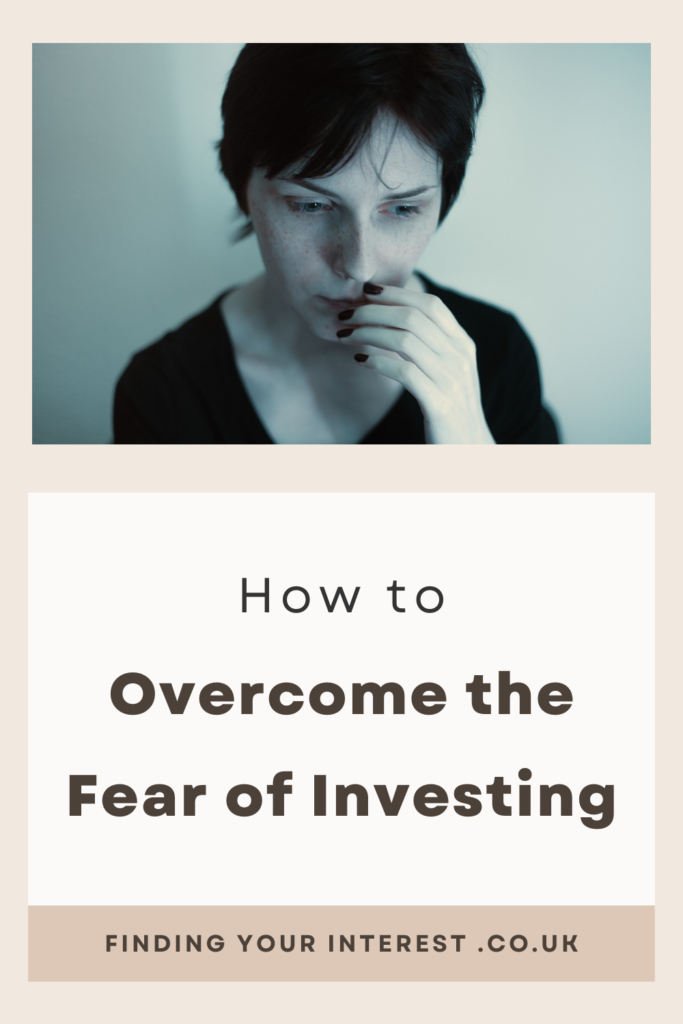Many people are afraid to invest out of fear of losing their entire investment. Investing is not without risk. However, there are a few steps that can be taken to help ease these fears and to try to ensure that your investments are safe in the long-term.
- Are investments safe?
- Learn to minimise investment risks
- How I faced my investment fears
- What’s at the root of your investment fears?
- Are investors risk averse?
- How to handle investment fears
- Final word on investment fears
Are investments safe?
Investing is a complex and risky process. While there are 1) historical trends, and 2) economic theories that should mean your investments rise in value over a long time scale, it’s important to remember that no investment is truly risk-free. Even the safest investments could lose money over time.
Investing is meant to be a long-term strategy. There will be both ups and downs. You need to get your head round this before you’re ready to invest. When you can handle the occasional bumps in the road, investing should be a great way to grow your money over time.
Learn to minimise investment risks
So while there are risks involved with investing, there are also ways to minimise those risks. For example, always do your research before investing in anything and diversify your investments (ie. don’t put all your eggs in one basket).
If you don’t invest, there’s no chance of reaping the rewards of investing. So don’t let fear of losing money keep you from investing at all.
It’s true that your investments can lose value. However, if you choose your investments wisely, it’s unlikely you’ll lose all of your money.

How I faced my investment fears
Investing is not something most people can jump into overnight.
I wanted to invest for months before I actually opened an investment account. But several things held me back.
At first, I didn’t know anything about investing. I thought it was trading which seemed risky and only for men in grey suits.
I didn’t know anyone who invested. Then I read about robo investing accounts on Faith’s blog. Slowly, investing started to seem possible and I dove into the world of personal finance and FIRE (Financial Independence, Retire Early). I read and read and figured out the basics of investing in funds, but it still took me a few months to pull the plug.
Investing is scary initially. But it doesn’t have to be.
So let’s look at common investing fears and worries that hold us back from starting to invest.
What’s at the root of your investment fears?
Worries about keeping your investments safe are centred on the fear of losing money. It’s scary watching your money lose value.
But with inflation, money stashed in cash savings for 20 years also loses value. What you could buy for £1 in 2000 costs much more than £1 today. So your money is slowly losing value anyway.
That’s where investing comes in.
The stock market will always go up and down. That’s why investing is a long-term strategy.
The challenges are:
1) not worrying about the fluctuations and putting your trust in your long-term strategy.
2) keeping your cool when when the market crashes. Will you be able to resist the panicked temptation to sell your stocks at a low price? Will you be able to afford to lose money? If you’re close to retirement, will a shrunken pension pot affect your ability to pay your day to day costs?
Are investors risk averse?
According to financier Warren Buffet, people who place money in the stock market should do so with a long-term outlook. You need to be comfortable with short-term losses to reap the rewards of long-term gains.
Interestingly, Buffet poses that the two emotions most experienced by those who invest in the stock market are greed and fear.
He believes that the public has it backwards when it comes to managing their feelings during market fluctuations. Smarter investors do the opposite of what the majority of investors do.
When “everyone” is saying how great the stock market is doing and discussing the incredible growth of their stocks and funds, this is the time to be wary. On the other hand, when the market is down and everyone’s investment fears are on high alert, that’s the best time to buy. His reasoning is that, since everything costs less in a down market and we’re in the market for the long haul, we’re bound to make a profit long-term.
It’s sound advice.
How to handle investment fears
Investment fears are natural, but don’t let them put you off investing. There are several ways to minimise these investment fears and feel confident that your investments should be relatively safe in the long-term:
1. Recognize that fear is a normal human emotion
It’s healthy to have fear, as long as you know there’s a reason for your concern. Everything outside of your comfort zone causes fear at first. If you can overcome your investment fear, you are likely to experience healthy increases in your net worth over time.
2. Accept investing is a long-term strategy
Accept the ups and downs. The stock market will rise and fall.
Accept the fact that investing in the stock market is unpredictable. It is what it is. Even if you’re a stock market analyst, you can’t predict with perfect accuracy which stocks and funds will soar and which will tank.
The longer you invest, the more time you have to ride out the rollercoaster and wait for the market to recover.
If you’re not able to adopt this perspective, you might not be ready to invest. You could consider starting small, or paying a little extra into your pension (which is also investing but you know it’s locked away until retirement so it helps you to focus on the long term).
3. Educate yourself – learn about investing
It’s important to educate yourself. The more you know, the less scary or overwhelming investing becomes. There are plenty of resources out there to help you understand how investing works. Reading books and blogs, or listening to podcasts or watching YouTube videos can be a great way to get started.
Talking with people who invest (or lurking in investment communities) can also be a great way to get more information and reassurance about the safety of investing.
4. Understand your risk tolerance
When the stock market starts to drop, investment fears set in. Those fears can take over your capacity to manage your money and investments successfully, unless you confront them head-on.
Some people tolerate fluctuations well and others panic. Knowing where you fall on that scale will help you to choose investments that you feel comfortable with.
Think about the worse case scenarios in advance and plan how much you can afford to invest.
Take your current situation into consideration when deciding what to invest in. If you’re due to retire in 5 years, you might not have enough time to invest in aggressive growth stocks so buying bonds, which are less volatile, may be a bigger part of your strategy. However, if you still have 15 or 20 more years of working and saving, you have time to ride out the crashes and wait for your assets to grow.
5. Diversify your investments
Investing in a stock or fund and hoping to make a huge profit is a thrill for some people. But investing in a single company always carries a big risk.
Investing in funds means you invest in many companies which spreads the risk.
Diversification provides some built-in protection against suffering major losses in the stock market.
This doesn’t mean you need to invest in 10 different funds. For many, a simple three fund ETF portfolio is enough.
Others may want to put most of their money in relatively safe funds, but to invest a small portion of their wealth into riskier individual stocks.
Diversity is important, but how you diversify is ultimately your choice.
6. Start with regular small investments
When I started investing, I had a couple of thousand that I wanted to take out of a low interest savings account and invest. But that sum was scary so I continued reading and researching for a few more months. I really wish I’d started immediately with small monthly contributions of £100 or £200. That would have allowed me to get started and feel comfortable investing before injecting a larger sum later.

By investing regularly you become more comfortable with investing. Investing stops being scary and unknown – it becomes normal. Something in your comfort zone.
7. Don’t check your investments too frequently
One of my best investing tips is – set and forget. In other words, automate your investments and don’t closely monitor how they’re doing.
Checking your investments too regularly can cause you to panic when they’re on their way down. On the flip side, if they’re on the way up, that could make you feel (over)confident in your abilities. Even paid investment professionals rarely outperform a good index fund.
8. Invest in spite of your fear
Research your investments thoroughly and make “Feel the fear and do it anyway” your personal mantra. Investing wisely can allow your money to grow over time, easing your fears in the process.
Make investments when prices are low, and watch your money grow over time. If you have years to build your investment pot, you’ll be able to take advantage of market dips and crashes and invest more when prices are low.
9. Simulate an investment portfolio
There are sites like JustETF where you can simulate investing.
Choose your funds and how much you’d theoretically like to invest. Then sit back and watch how they rise and fall over time.
This can give you a real understanding of how the stock market rises and falls over time. While your investments may go down in value one month, they could rise in value the next. Or you may see decreases for a few months in a row before the value begins to climb.
By watching what the market does with theoretical investments, you can learn your tolerance to risk and whether you’d be happier with a low-risk portfolio, a moderate portfolio or a riskier one.
10. Talk to a financial advisor
There’s a reason I’ve left this until last, as I believe there’s a lot you can do to educate yourself.
A financial advisor can help you understand your investment options and help you mitigate the risks involved with each option. They can advise you on specific funds and the ideal balance for you. This becomes more relevant when you have a large portfolio and/or as you near retirement. Some recommend talking to a financial advisor around 5 years before you plan to retire.
Even then, I’d recommend educating yourself first so you know what questions to ask. If you want to consider talking to a financial advisor, this is a great article on how to choose one.
Final word on investment fears
Gathering information from experts and learning to examine your feelings about investing and confront your investment fears are important aspects of your investment life.
Being aware of the different types of investment fears, and how to handle them, should help you to make sound investment decisions that will safeguard your financial security, skilfully manage your portfolio and keep your investments safe.
—
Liked this article? Sign up to get notifications of new posts sent straight to your inbox.


One reply on “Are investments safe? 10 ways to handle investment fears”
[…] governments or other organisations with a long-term credit rating) are generally considered to be relatively safe investments. You effectively loan your money for a fixed period (often 5, 10 or 15 years) and they guarantee […]